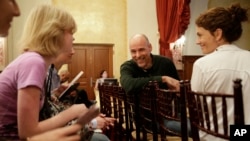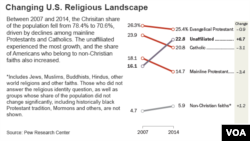A major new survey of religious life in the United States shows that the Christian share of the country's population is declining while the number of adults who do not identify with any organized religion is growing.
In "America's Changing Religious Landscape," the Pew Research Center says the U.S. still has more Christians than any other nation, with more than seven in 10 adults, or 173 million Americans, identifying with the tradition.
That figure, however, has dropped dramatically since 2007, when just over 78 percent of adults, or 178 million Americans, called themselves Christians. During the same period, the number of people who declared themselves as either atheist, agnostic (someone who is unsure or unconcerned about the existence of God) or of no particular faith rose from 16 percent to nearly 23 percent.
Alan Cooperman, Pew's director of religious research, told reporters that it is "not a simple question" why the number of self-identified Christians is declining in the U.S., but that sociologists have offered a variety of theories.
He said many young adults in the country's Millennial generation (those born from the early 1980s to the early 2000s), are generally more liberal in their social views and have turned away from organized religion because of the prominent role conservative religious views have played in American political debates. In addition, Cooperman said "there is a broader withdrawal from (organized) institutions" of all types in the U.S.
On a global scope, Cooperman said that "as nations become wealthier, they become less religious."
The number of Americans unaffiliated with any religious faith – a group that researchers have dubbed "nones" – is widespread across age, race, gender and income level, but is especially pronounced among young adults.
"The pace of their growth is really remarkable," said Gregory Smith, the primary researcher for the report.
Among particular Christian faiths, Roman Catholicism has suffered the most losses among its ranks, dropping from 54 million members in 2007 to 51 million last year. The number of mainline, or liberal, Protestants fell from 51 percent to around 46 percent during that time period.
Meanwhile, the survey found growing diversity within the U.S. religious population, with non-Christian faiths rising from nearly 5 percent in 2007 to nearly 6 percent in 2014, especially among Muslims and Hindus, although their overall numbers remain small. Overall, the U.S. Christian community has become more racially and ethnically diverse because of the nation's growing Hispanic population.
The survey shows interfaith marriages have also grown in number, rising from 19 percent of those who married before 1960 to nearly 40 percent of those who married since 2010.
The Pew Research Center based its findings on interviews with more than 35,000 people between June and September of last year.






